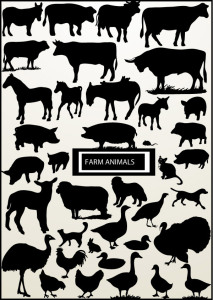Our Responsibilities to the Animals We Eat
Our Responsibilities to the Animals We Eat
Each year more than nine billion animals go to slaughterhouses in the USA to be killed, processed, and packaged into the beef, pork, lamb and chicken that eventually find their way onto our dinner plates. It is an industrial process on a staggeringly vast scale, and it has some fundamental problems.
While the number of animals fated to pass through industrial processes has continued to grow in recent decades, the number of independent family farmers who care for them has continued to decline due to high-efficiency corporate mechanical processes and confinement strategies that optimize profit. The animals have been relegated to “units of production.” The population of human beings in our rural regions in the heartland of America has, meanwhile, been decimated as family farmers have steadily fallen victim to vertical integration and the relentless economic demands of corporate bottom lines.
On Friday of last week I journeyed to Omaha – Gateway to the West – to be part of the annual conference of the Nebraska Sustainable Agriculture Society (NSAS). The primary emphasis of the gathering was on local, sustainable community food systems. But the conference also featured a keynote address from Wayne Pacelle, the director of the Humane Society of the United States (HSUS). Mr. Pacelle is regarded with fear and loathing among industrial livestock titans who, with their mammoth Concentrated Animal Feeding Operations (CAFOs) have made Nebraska into a dominant force providing meat for our tables.
In this context over the last few years, HSUS and NSAS, partnering with the Nebraska Farmers Union, have established an innovative Ag Council to promote humane husbandry of farm animals. While Nebraska was the pioneer in this progressive action, eight other states have now formed similar Ag Councils, and more are coming.
So perturbed are corporate livestock barons about the specter of humane animal husbandry, that they’ve established phony “public interest” front groups to wage a proxy campaign against HSUS. According to many observers, that animus has also been reflected in the actions of Nebraska’s Land Grant University. UNL has by and large cast its lot with industrial chemical agriculture and corporate livestock monoliths* while severing ties with NSAS because of its partnership with HSUS. As critics have noted, land grant universities in general have since the 1980s become less oriented to serving the human beings who are citizens of their states, and progressively more dedicated to serving the corporations that do business in their states. That’s where the money is.
Wayne Pacelle at the NSAS conference. “Farmers should be leading the way in the humane treatment of animals.” (Author photo)
“Animal welfare should not be a controversial subject,” Pacelle told the conference. “It’s a natural thing. We have been in relation with animals for millennia.”
“It’s not about animal rights, but rather it’s about our human responsibility to our animal relatives. We have duties,” Pacelle said. “Animal life does not exist solely for our exploitation. How do we handle that responsibility? Ultimately there is no escaping the moral issue. Farmers should be leaders in fulfilling our basic human responsibility to the animals who give up their lives that we may eat.”
Billions of animals suffer needlessly in confinement because they are bound up in corporate economic activity. The economics of industrial efficiency have spawned what might be termed a race to the bottom, not just for the animals, but also for the underpaid human beings – the farm workers and packing-house employees – who are charged with managing them.
As NSAS Board member Kevin Fulton noted during the conference, “There’s a direct correlation between moving the animals off the land and into the vertical integration of industrial confinement operations, and the socially destructive process of moving people off the land. We need fewer animals, and more farmers.”
If industrial food-production corporations continue to regard animals as just dull, dumb commodities – units of production to be fattened with genetically modified grains grown in oceans of glyphosate and pumped up beyond natural reason with hormones and antibiotics – then we are failing at our basic responsibility to be in right relationship with them.
* The University of Missouri has calculated the share of production held by just four firms in different sectors. In total beef production, for example, the share of the top four firms (Cargill, Tyson, JGF, and National Beef) increased from 69 percent in 1990 to 82 percent in 2012. The story is the same in poultry, pork, flour milling, and other sectors. Fewer firms control bigger and bigger shares of total production, making it progressively harder for other farmers to get fair prices or earn a living from their production

